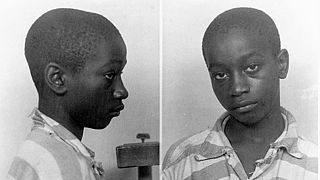Murder conviction of boy, 14, is tossed 70 years after his execution; judge cites bad lawyering

George Stinney Jr. was the youngest person to be executed in the U.S. in the 20th century.
A South Carolina judge has vacated the murder conviction of a 14-year-old black youth who was executed in 1944 after being found guilty by an all-white jury in a one-day trial.
Judge Carmen Mullen granted a writ of coram nobis and vacated the conviction of George Stinney Jr., obtained just one month after his arrest in March 1944, report the New York Times, the Washington Post, the Manning Times and the Associated Press.
Stinney was accused of killing two girls, ages 11 and 7, possibly with an iron rod, after police said he confessed to the crime. At his trial for the older girl’s death, jurors convicted him after deliberating only 10 minutes. No appeal was filed, and no trial transcript remains. Stinney was sent to the electric chair less than three months later, and was so small that the guards noted that the straps on the chair could not fit him, reports the AP.
The youth had an appointed lawyer, “but it appears he did little to nothing in defending Stinney,” Mullen wrote in her opinion (PDF). He did not question Stinney’s relatives, who testified at a hearing this past January that Stinney was with them on the date of the murder and could not have been absent long enough to commit the crime. He did not seek a change of venue or seek additional time to prepare the case. And based on the length of the trial, Mullen said, the lawyer apparently asked little or no questions on cross-examination and presented no or few witnesses on behalf of his client. Nor did he file an appeal.
“That is the essence of being ineffective,” Mullen said, “and for these reasons the conviction cannot stand.”
“I can think of no greater injustice than the violation of one’s Constitutional rights which has been proven to me in this case,” she wrote.
Charleston School of Law professor Miller Shealy Jr. was one of the lawyers representing Stinney’s family. “I am not aware of any case where someone who was convicted has had the trial conviction and sentence vacated after they’d been executed,” he told the New York Times.



